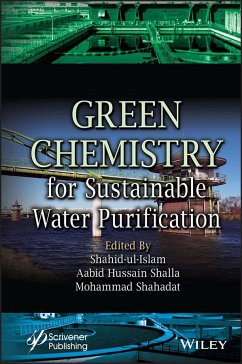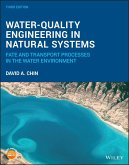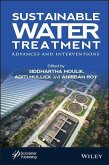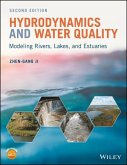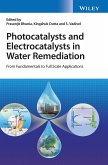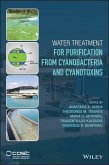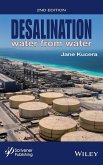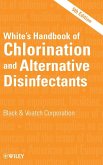GREEN CHEMISTRY for Sustainable Water Purification
Green Chemistry for Sustainable Water Purification provides systematic coverage of the most recent research and development in clean water treatment technologies based on green materials and nanocomposites.
Providing safe drinking water is one of the top priorities for scientists and industrialists working on projects, and one particular problem is the contamination of groundwater with toxic organic and inorganic compounds released by various industries. The presence of contaminants or industrial effluents in drinking water systems has increasingly become a major environmental challenge. To address the problem, several methods, including ion exchange, membrane filtration, advanced oxidation, biological degradation, photocatalytic degradation, electro-coagulation, and adsorption, are in operation for removing or minimizing these wastes. The purification process of wastewater using conventional methods, however, hasproved to be markedly ineffective, very difficult, and highly expensive.
On the other hand, for the remediation of water resources, a concept like green chemistry, based on the application of biological agents including polymers, bacteria, and fungi, has received great scientific attention as it helps to avoid the toxic by-products of conventional techniques and enhances eco-friendly wastewater treatment approaches.
This book discusses the different treatment technologies with a special focus on the green adsorption approach, using biological and hybrid biochemical treatment technologies to prevent water contamination and maintain the ecosystem. It discusses the analysis of organic and inorganic pollutants from industrial wastewater. It also focuses on the removal and recovery of organic and inorganic contaminants from the environment and several case studies describing the removal and recovery of environmental pollutants using green technology are given. The recycling of low-cost along with green adsorbent technology is explained in detail. Finally, the book highlights treatment technologies with effective pollutant removal capacities that are used in modern water treatment units.
Audience
The book will serve as an important resource for materials scientists, chemists, chemical engineers, biotechnologists, textile engineers and environmental scientists. It will also be valuable to industrial organizations, consulting engineering companies, etc. for the selection and implementation of the most sustainable wastewater treatment technologies.
Hinweis: Dieser Artikel kann nur an eine deutsche Lieferadresse ausgeliefert werden.
Green Chemistry for Sustainable Water Purification provides systematic coverage of the most recent research and development in clean water treatment technologies based on green materials and nanocomposites.
Providing safe drinking water is one of the top priorities for scientists and industrialists working on projects, and one particular problem is the contamination of groundwater with toxic organic and inorganic compounds released by various industries. The presence of contaminants or industrial effluents in drinking water systems has increasingly become a major environmental challenge. To address the problem, several methods, including ion exchange, membrane filtration, advanced oxidation, biological degradation, photocatalytic degradation, electro-coagulation, and adsorption, are in operation for removing or minimizing these wastes. The purification process of wastewater using conventional methods, however, hasproved to be markedly ineffective, very difficult, and highly expensive.
On the other hand, for the remediation of water resources, a concept like green chemistry, based on the application of biological agents including polymers, bacteria, and fungi, has received great scientific attention as it helps to avoid the toxic by-products of conventional techniques and enhances eco-friendly wastewater treatment approaches.
This book discusses the different treatment technologies with a special focus on the green adsorption approach, using biological and hybrid biochemical treatment technologies to prevent water contamination and maintain the ecosystem. It discusses the analysis of organic and inorganic pollutants from industrial wastewater. It also focuses on the removal and recovery of organic and inorganic contaminants from the environment and several case studies describing the removal and recovery of environmental pollutants using green technology are given. The recycling of low-cost along with green adsorbent technology is explained in detail. Finally, the book highlights treatment technologies with effective pollutant removal capacities that are used in modern water treatment units.
Audience
The book will serve as an important resource for materials scientists, chemists, chemical engineers, biotechnologists, textile engineers and environmental scientists. It will also be valuable to industrial organizations, consulting engineering companies, etc. for the selection and implementation of the most sustainable wastewater treatment technologies.
Hinweis: Dieser Artikel kann nur an eine deutsche Lieferadresse ausgeliefert werden.

